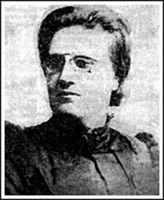Paulina Kuczalska-Reinschmit
Why do we consider this woman to be an important person?
Paulina
Kuczalska - Reinschmit was the most radical fighter of
women's movement in the Polish lands before the outbreak of the First World
War. She was the first who postulated women’s demands, separate from the issue
of national liberation. She co-founded a number of organizations and
educational institutions. She founded the magazine „Helm”, which has been
written about the electoral rights of women, their participation in the
government, the equality of women with men in the civil law, women wage growth,
expansion of education and social reform and social welfare.
Especially she was appreciated for the leadership ability and she was called „Commander”,
„Hetman”, and „Helmsman” by surrounding her activist.
Biography
Kuczalska Paulina
was born on January 15, 1859
in Krakow. She came
from a wealthy noble family. She was a daughter of Ewelina Porczyńska and Leon
Kuczalski. She took a good home education. Paulina’s mother belonging to the
“Enthusiasts” group of Narcyza Żmichowska had influence for her education and
future. Her father, the owner of a
landed estate, was rake and spendthrift. After his death, she moved to Warsaw, together with her
mother. There, in 1879, she married Stanisław Reinschmit, the noble and
high-ranking official of Land Credit Society. Marriage quickly fell apart and
Stanisław who was sick venereal disease infected his wife. Their only son, Leo
remained with his father.
After the divorce, she decided to invest the money in her own education.
She studied medicine in Geneva and Brussels. She spoke
French fluently, she knew German pretty good and read in Italian and English.
Kuczalska started as a journalist before going abroad and her first article was
published in the „Echo” in 1881. She also published her articles in „Illustrated
Magazine”, „Warsaw Courier”, „The Daily Courier”, „Cell” and „New Newspaper”.
She wrote about issues of education and women’s job. Stay abroad made her
interest in women's issues. She met Maria Szeliga and took part in An
International Congress of Women's Institutions with her (Paris 1889).
After returning to Warsaw she created the group „Women's
Union”. She ran salon, where female students
were given information about educational opportunities in the country and
abroad. After moving to Lviv she founded the magazine „Helm” (1895-1897), which
allowed women to express themselves freely, to express their thoughts and
feelings, to know each other, develop individuality, to gain equal rights and
jobs.
In 1892, during the first of Lviv’s National Exhibition, she organized women's
congress. Prepared speeches: „The admission of women to universities”, „Female
schools”, and „The vocational schools for girls”, evidenced to high engagement
in education of women.
After returning to Warsaw
in 1898 she was a co-founder Rural Housewives Association, changed in The
Landladies Association. She initiated the creation of Working Women's Aid
Society Office to raise funds for Polish women studying abroad. All these
actions were intended to improve the professional situation of women and
contribute to the equal position that men had.
In 1905, she announced a memorandum in which she requested to give women active
and passive voting rights in Polish
Land. 4000 people signed
up to it. Since then, the struggle for the right to vote became her main aim.
In 1907, she resumed in Warsaw
„Helm” (1907-1914) and founded the Association of Polish Women's Equality. The
Association created the first common and concrete women’s emancipation project,
the equality in every area of life - both in law and in custom.
After the First World War „Helm” suspended activities and the Association lost its
meaning. There were formed new organizations. Kuczalska was forgotten. It had
an impact on her lonely life she shared with Józefa Bojanowska – her old
coworker and faithful friend. She died on September 13, 1921 and was buried at
the Powązki Cemetery
in Warsaw.
Bibliography:
- E. Szermentowski, Hetmanka wielka i koronna, „Kierunki” 1959, nr 3
- R. Pachucka, Pamiętniki 1886-1914, Wrocław 1958
- Polski słownik biograficzny, hasło: Paulina Kuczalska-Reinschmit, oprac. J. Hulewicz, Wrocław 1971
Links:
- http://www.google.pl/search?newwindow=1&q=paulina%20kuczalska-reinschmit&um(available 22.08.2013)
- http://pl.wikipedia.org/wiki/Paulina_Kuczalska-Reinschmit(available 17.08.2013)
- http://annadryjanska.natemat.pl/31151,hetmanka (available 15.08.2013)
- http://www.feminoteka.pl/muzeum/readarticle.php?article_id=1#12 (available 20.08.2013)
- Source:
Library of the Institute of Literary Reseaech of the Polish Academy Of Sciences
Rights; PD, This photo is in library’s resource excluded from copyright protection.




